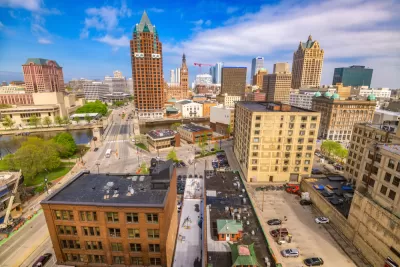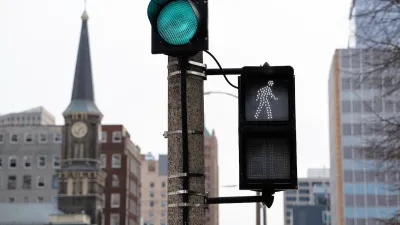The city hopes to combat a growing reckless driving 'crisis' with traffic calming, bike lanes, and other projects aimed at improving roadway safety.

Jeramey Jannene reports on the City of Milwaukee's efforts to eliminate reckless driving, which the acting mayor has called a public safety crisis.
A total of $8.5 million in property tax revenue from four tax incremental (TIF) districts would be allocated to fund traffic calming and safety improvements including protected bike lanes, curb bump-outs, narrower travel lanes, high-impact paving and new pedestrian infrastructure.
The proposal seeks to address rising traffic deaths and reduce dangerous driving behaviors through a variety of traffic calming and safety projects. "It would build on other new initiatives to tackle what is widely viewed as a reckless driving crisis. In 2021, the Common Council allocated $7.15 million from its federal American Rescue Plan Act grant towards projects on 16 corridors, making speed humps free for nearby property owners and lowering the default speed limit from 25 to 20 miles per hour," according to the article. "The proposed projects are located along N. Van Buren St. in Downtown, near the Midtown Center shopping mall on the city’s north side and in the the area around Stadium Business Park and Burnham Park on the city’s south side."
The article details other TIF-funded projects besides street improvements, including a portion of the riverwalk and dockwall and local debt relief.
FULL STORY: City Poised To Use $8.5 Million From TIFs to Combat Reckless Driving

Alabama: Trump Terminates Settlements for Black Communities Harmed By Raw Sewage
Trump deemed the landmark civil rights agreement “illegal DEI and environmental justice policy.”

Planetizen Federal Action Tracker
A weekly monitor of how Trump’s orders and actions are impacting planners and planning in America.

The 120 Year Old Tiny Home Villages That Sheltered San Francisco’s Earthquake Refugees
More than a century ago, San Francisco mobilized to house thousands of residents displaced by the 1906 earthquake. Could their strategy offer a model for the present?

In Both Crashes and Crime, Public Transportation is Far Safer than Driving
Contrary to popular assumptions, public transportation has far lower crash and crime rates than automobile travel. For safer communities, improve and encourage transit travel.

Report: Zoning Reforms Should Complement Nashville’s Ambitious Transit Plan
Without reform, restrictive zoning codes will limit the impact of the city’s planned transit expansion and could exclude some of the residents who depend on transit the most.

Judge Orders Release of Frozen IRA, IIJA Funding
The decision is a victory for environmental groups who charged that freezing funds for critical infrastructure and disaster response programs caused “real and irreparable harm” to communities.
Urban Design for Planners 1: Software Tools
This six-course series explores essential urban design concepts using open source software and equips planners with the tools they need to participate fully in the urban design process.
Planning for Universal Design
Learn the tools for implementing Universal Design in planning regulations.
Clanton & Associates, Inc.
Jessamine County Fiscal Court
Institute for Housing and Urban Development Studies (IHS)
City of Grandview
Harvard GSD Executive Education
Toledo-Lucas County Plan Commissions
Salt Lake City
NYU Wagner Graduate School of Public Service





























